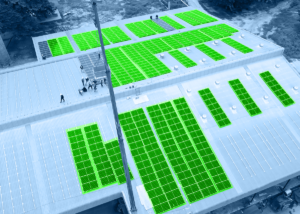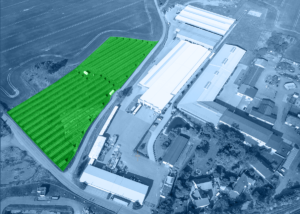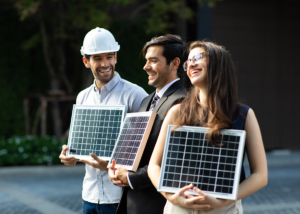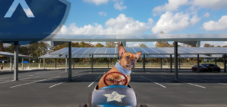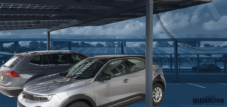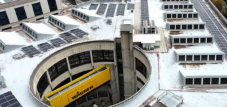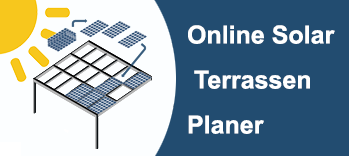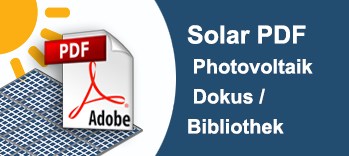Solar/photovoltaics: The future of energy production – solar systems as the key to sustainable supply
Language selection 📢
Published on: July 2, 2023 / update from: July 2, 2023 - Author: Konrad Wolfenstein
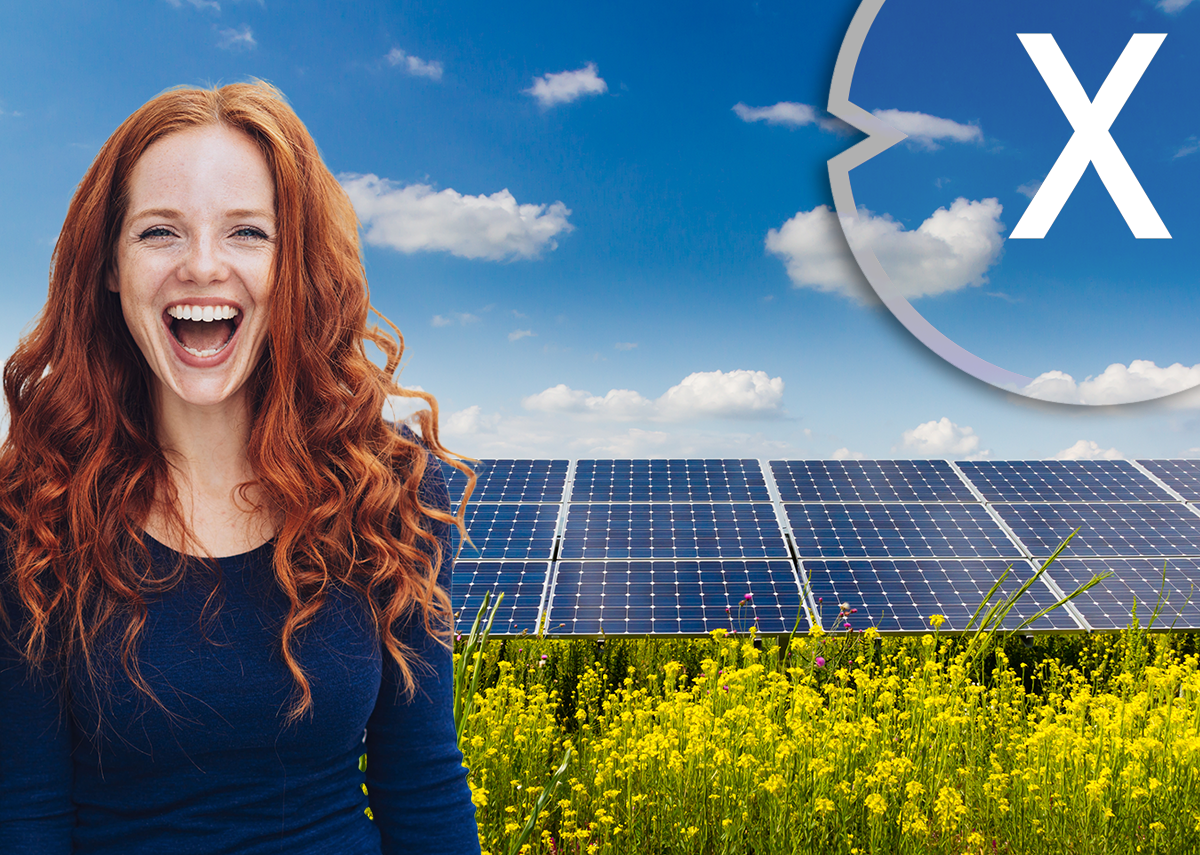
The future of energy production – solar systems as the key to sustainable supply – Image: Xpert.Digital
The future of energy production: solar systems as the key to sustainable supply
The energy transition is one of the central issues of our time. Given the pressing challenges of climate change and limited resources, more and more people are focusing on renewable energy. In this context, solar energy is becoming increasingly important. Solar systems offer a clean and sustainable way to generate energy and meet growing energy needs. In this extensive text we will look at the most important aspects and interesting details about solar systems.
How solar systems work
Solar systems use solar radiation to convert sunlight into electrical energy. The central components of a solar system are the photovoltaic modules, which consist of solar cells. These cells are made of semiconductor materials such as silicon, which generate an electrical charge when sunlight hits them. The direct current energy generated in this way is converted into alternating current by inverters, which can be used directly or fed into the power grid.
Types of solar systems
There are different types of solar systems that can be used depending on the application and needs. The most common types include:
- Photovoltaic systems: These systems convert sunlight directly into electrical energy.
- Solar thermal systems: Here the heat from solar radiation is used to heat water or provide space heating.
- Solar thermochemical systems: These use solar energy to generate chemical reactions to produce electricity or fuel.
- Concentrating solar systems: These systems use mirrors or lenses to concentrate solar radiation at a point and produce high temperatures.
Advantages of solar energy
The use of solar systems offers numerous benefits, both for individuals and for society as a whole.
These include: – Clean and renewable energy: Solar energy produces no harmful emissions and is inexhaustible.
– Cost savings: By installing solar systems, consumers can reduce their electricity bills and achieve long-term cost savings.
– Independence from energy suppliers: Solar systems enable users to generate their own energy and be less dependent on conventional energy suppliers.
– Reducing greenhouse gas emissions: Using solar energy helps reduce carbon footprint and combat climate change.
– Job creation: The growing solar industry offers numerous employment opportunities and supports economic development.
Challenges and innovations
Although solar energy offers great potential, there are also challenges that need to be overcome. This includes:
- Fluctuating Availability: Sunlight exposure varies depending on location, time of day and weather conditions. Energy storage technologies such as batteries therefore play an important role in ensuring a continuous energy supply.
- Cost: Although the cost of solar panels has fallen in recent years, the initial investment is still a hurdle for some consumers and businesses. However, advances in technology and economies of scale will lead to further cost reductions.
- Integration into the power grid: The integration of large amounts of solar energy into the power grid requires improved grid infrastructure and intelligent grid solutions to ensure the stability and reliability of the power supply.
Future developments
The future of solar energy looks promising. Innovations and research efforts focus on improving the efficiency of solar cells, developing new materials and technologies, and integrating solar energy into smart energy grids. In addition, trends such as decentralized energy generation and the combination of solar energy with energy storage and electromobility open up new opportunities for sustainable energy supply.
➡️ Solar systems are playing an increasingly important role in the transition to a sustainable energy supply. They offer numerous benefits, from clean energy production to cost reduction and independence from traditional energy sources. By overcoming challenges and progressing in research and development, solar energy will continue to gain importance and have a significant impact on the future of energy production. Investing in solar systems, whether for small or large projects, is not only ecologically sensible, but also economically attractive and a contribution to the global energy transition.
Plan your solar system for the most common applications conveniently online with our solar system planner!
With our user-friendly solar system planner you can plan your individual solar system online. Whether you need a solar system for your home, your business or for agricultural purposes, our planner offers you the opportunity to take your specific requirements into account and develop a tailor-made solution.
The planning process is simple and intuitive. You simply enter relevant information. Our planner takes this information into account and creates a tailor-made solar system that meets your needs. You can try out different options and configurations to find the optimal solar system for your application.
Additionally, you can save your plan to review later or share with others. Our customer service team is also available to answer your questions and provide support to ensure your solar system is optimally planned.
Use our solar system planner to plan your individual solar system for the most common applications and advance the transition to clean energy. Start now and take an important step towards sustainability and energy independence!
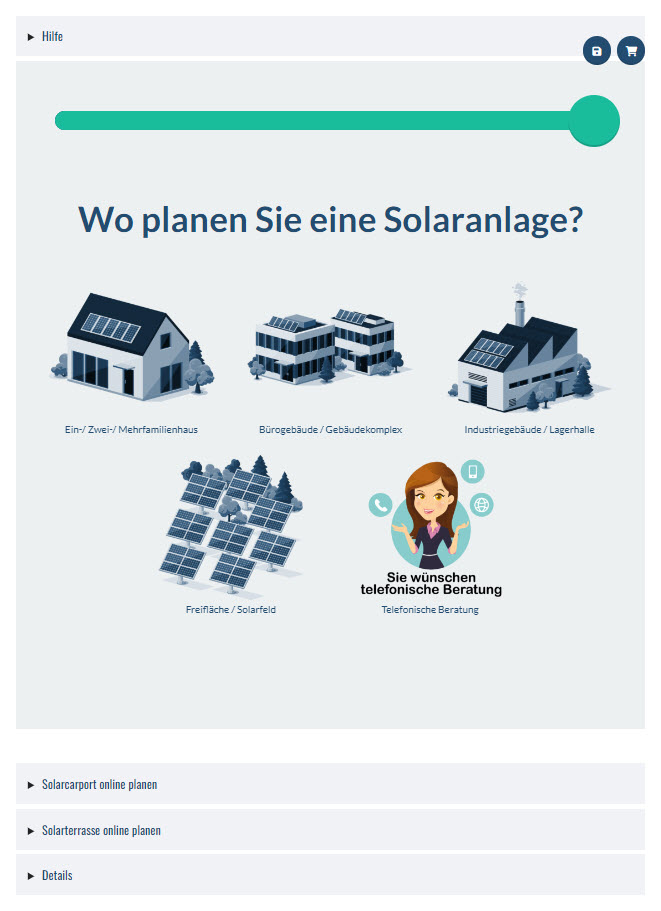
The solar system planner for the most common applications: Plan the solar system online here - Image: Xpert.Digital
More about it here:
Renewable energies: driver for new careers and solution to the waste of jobs in the 'old economy'
The increased use of renewable energies harbors the potential to create new professionals and at the same time to absorb the waste in the so -called “Old Economy”. The switch to renewable energies opens up various options for innovative and sustainable jobs that can complement or even replace the traditional sectors.
One area that benefits from renewable energies is the energy industry itself. The expansion of renewable energies requires specialists in areas such as solar and wind turbine installation, maintenance and servicing, energy efficiency consulting and management as well as grid integration of renewable energies. These jobs are often locally based and can help create jobs in rural areas.
In addition, renewable energies also open up new opportunities in the areas of research and development. The development of more efficient and cost-effective solar cells, battery technologies, geothermal systems and other renewable energy technologies requires highly qualified scientists, engineers and technicians. This area of research and development can lead to technological breakthroughs that can impact not only the energy sector but other industries as well.
Another area that is influenced by renewable energies is the construction industry. The expansion of renewable energies requires the construction of solar parks, wind farms, biomass plants and other infrastructure. This creates jobs for architects, civil engineers, construction workers and other construction professionals.
New career opportunities are also emerging in the area of energy efficiency. Energy consultants and managers can help companies and households optimize their energy consumption and realize energy savings. This can have both financial benefits and environmental impacts.
An interesting aspect of renewable energies is their connection to the circular economy and to deal with the waste in the “Old Economy”. Renewable energies enable the use of energy sources such as sun, wind and biomass that are available indefinitely and, in contrast to fossil fuels, do not generate emissions or waste. By using renewable energies, the dependence on non -renewable resources such as coal, oil and gas can be reduced.
In addition, renewable energies in combination with circular economy approaches can form the basis for new business models. For example, waste products from agriculture or food production can be used to produce biogas. This not only creates new energy sources, but also reduces waste and provides opportunities for job creation in the bioenergy industry.
➡️ The opportunities for new professionals through renewable energies are promising. The global energy transition and the increasing need for sustainable energy sources open up a wide range of job opportunities. However, it is important that the corresponding educational and training systems are developed in order to convey the necessary skills and skills for these professions. This is the only way to fully exhaust the advantages of renewable energies and at the same time reduce waste in the “Old Economy”.
Which new jobs will be created by renewable energies and which jobs will be eliminated as a result of the energy transition?
The increasing use of renewable energies and the associated energy transition will create many new jobs, while other jobs may disappear or change significantly.
New jobs through renewable energies
- Solar technician: Specializes in the installation, maintenance and repair of solar systems.
- Wind Energy Technician: Responsible for the installation and maintenance of wind turbines.
- Energy consultant: Advising private households and companies on energy efficiency and renewable energies.
- Battery Storage Expert: Develops and implements energy storage and distribution systems.
- Electromobility specialist: maintenance and repair of electric vehicles and charging systems.
- Smart Grid Analyst: Analyzes and optimizes intelligent power grids for efficient energy distribution.
- Green Building Architect: Designs energy efficient and sustainable buildings.
- Biomass Technician: Expertise in the use of biomass as a renewable energy source.
- Geothermal Engineer: Researches and implements technologies to utilize geothermal energy.
- Sustainability Manager: Responsible for the development and implementation of sustainable business strategies in companies.
Professions that could be affected by the energy transition
- Coal miners: As coal-fired power generation declines, jobs in the coal industry could decline.
- Oil and gas power plant technicians: The transition to renewable energy could reduce demand for oil and gas power plants.
- Classic chimney sweep: With the decrease in fossil fuels, fewer chimney sweeps could be needed.
- Nuclear power plant technician: The expansion of renewable energy could reduce the demand for nuclear power plants.
- Gas Station Clerks: With the increasing use of electric vehicles, gas station clerks may be in less demand.
- Energy-intensive industries: Industries that use a lot of energy may need to adapt their production or operations.
- Fossil fuel suppliers: Companies that supply fossil fuels could reduce their operations.
- Oil and Gas Heating Contractors: Demand for oil and gas heating may decrease while heat pumps and other renewable heating technologies increase.
- Fossil fuel waste disposers: With less fossil fuels, there could be less waste that needs to be disposed of.
- Traditional energy suppliers: Traditional energy suppliers may need to adapt to include renewable energy in their portfolio and change their business models.
➡️ The transition to renewable energy also offers new opportunities for retraining and realignment of skilled workers. Many jobs could be transformed and adapted by the energy transition to meet the need for skilled workers in the green economy.
What is important when building solar systems for small and large systems
The use of solar energy is becoming increasingly important worldwide as it represents an environmentally friendly and sustainable energy source. Both in small systems for private households and in large systems for companies and industrial plants, various factors play a decisive role in using the full potential of solar power and maximizing the efficiency of the solar systems.
Site selection
The choice of location is crucial for the success of a solar system. Ideally, the location should be free of shade and have as much sunlight as possible. For large systems, attention must also be paid to the availability of sufficient space to enable optimal use of solar energy.
Solar panels
The choice of solar modules is an important factor in the performance of the solar system. There are different types of solar panels including monocrystalline, polycrystalline and thin film panels. The efficiency and cost of the modules can vary depending on the technology, so careful selection should be made.
Inverter
The inverter is an essential part of any solar system as it converts the direct current generated into alternating current, suitable for household use or feeding into the electricity grid. Selecting a high-quality and efficient inverter is important to minimize energy losses and optimize system performance.
Mounting system
The mounting system holds the solar modules securely in place and ensures optimal alignment with the sun. There are different mounting systems, such as flat roof mounting, pitched roof mounting or open space systems. Choosing the right system depends on the location and spatial conditions.
Financing and funding
Solid financing is crucial for large systems, as the investment costs can be high. Here, government funding programs and incentives can contribute to financing and improve the economic viability of the system.
Maintenance and repair
For both small and large systems, regular maintenance and servicing is important to ensure the long-term performance and efficiency of the system. Dirty modules or defective components can affect performance and should therefore be checked regularly and cleaned or replaced if necessary.
Integration into the power grid
Integration into the power grid is an important challenge for large systems. The grid connection conditions must be met and it may make sense to implement energy storage or intelligent control systems to ensure grid stability and optimize self-consumption.
Monitoring and data analysis
Modern solar systems can be equipped with monitoring systems that provide operators with real-time data on the performance and efficiency of the system. By analyzing this data, potential problems can be identified, performance optimized and maintenance actions planned.
Environmental Impacts and Permits
For large-scale installations, it is important to consider the potential environmental impact and obtain all necessary permits. This can include the protection of flora and fauna, landscape protection or dealing with waste heat.
Legal and regulatory aspects
When planning and implementing solar systems, legal and regulatory aspects must also be taken into account. This can include compliance with building regulations, grid feed-in regulations, environmental regulations or tax aspects.
➡️ The construction of solar systems for both small and large systems requires a holistic view and planning in order to enable the best possible use of solar energy. Through careful location selection, the choice of high-quality components, efficient integration into the power grid and regular maintenance, solar systems can generate energy reliably and efficiently and thus make an important contribution to sustainable energy supply.
Planning security with solar power in focus: Solar systems as the key to sustainable supply and their expansion for a secure and predictable future
Solar systems as the key to sustainable supply: From perceived security to planning security for the next years and decades.
The use of solar systems to generate clean and renewable energy is playing an increasingly important role in sustainable energy supply. Solar systems offer numerous benefits, from reducing CO2 emissions to becoming independent of fossil fuels. They are an investment in a sustainable and clean future. Important aspects are highlighted below that underline the importance of solar systems as a key to sustainable supply and how they can be further expanded.
Felt security
Installing your own solar system offers homeowners a sense of energy independence and security. By producing their own electricity, they are less dependent on external energy sources and can protect themselves from rising energy prices.
environmental friendliness
Solar systems produce clean energy without causing harmful emissions. Operating a solar system therefore contributes to reducing greenhouse gas emissions and helps in the fight against climate change.
Cost savings
Although the initial investment costs for solar systems can be high, they result in significant cost savings in the long term. By producing your own electricity, the costs of purchasing electricity from the public grid can be reduced or even eliminated. In addition, financial advantages can be achieved through government funding programs and the feed-in tariff.
Long-term planning security
Solar systems offer long-term planning security for the coming years and decades. Unlike fossil fuels, solar energy sources are virtually inexhaustible. The sun will continue to be available as an energy source in the future, making investing in solar systems a safe and sustainable decision.
Technological development
The technology in the field of solar energy is constantly evolving. New developments such as more efficient solar modules, improved energy storage and intelligent control systems enable even more effective use of solar energy. The expansion of solar systems therefore offers the opportunity to benefit from future technological advances.
Decentralized energy production
Solar systems enable decentralized energy generation. By installing solar systems on the roofs of houses, companies or public buildings, energy can be generated where it is needed. This reduces the need for long transmission lines and increases security of supply.
Energy transition and social commitment
The expansion of solar systems contributes to the energy transition and enables individuals, companies and communities to actively contribute to climate protection. The use of solar energy utilizes renewable resources and reduces dependence on fossil fuels.
In order to further expand the importance of solar systems as a key to sustainable supply, various measures are possible:
- Support programs: Governments and organizations can offer financial incentives and support programs for the expansion of solar systems in order to reduce investment costs and support the use of renewable energy.
- Education and awareness: Comprehensive education about the benefits and possibilities of solar systems can help raise awareness of renewable energy in society and increase acceptance and demand for solar energy.
- Infrastructure development: Expanding infrastructure for solar integration, such as installing electric vehicle charging stations, can further stimulate demand for renewable energy.
- Research and development: Investments in research and development in the field of solar technology can help to further improve the efficiency of solar systems and reduce costs.
- Partnerships and collaborations: Through collaboration between governments, companies and research institutions, innovative solutions and new business models can be developed to promote the expansion of solar systems.
- Solar systems play a crucial role in sustainable energy supply and offer numerous advantages, from reducing environmental impact to security and planning security for the future. Through targeted measures to promote and further develop solar energy, its contribution to sustainable supply can be further strengthened.
- Warehouses, production halls and industrial halls with their own power source from a photovoltaic roof system - Image: NavinTar|Shutterstock.com
- Industrial plant with its own power source from an outdoor photovoltaic system - Image: Peteri|Shutterstock.com
- Plan solar systems with photovoltaic solutions for freight forwarding and contract logistics
- B2B solar systems and photovoltaic solutions & advice
- Plan photovoltaics for warehouses, commercial halls and industrial halls
- Industrial plant: Plan a photovoltaic open-air system or open-space system
- Plan solar systems with photovoltaic solutions for freight forwarding and contract logistics
- B2B solar systems and photovoltaic solutions & advice
With Xpert.Solar your individual solar system solution
I would be happy to serve as your personal advisor.
You can contact me by filling out the contact form below or simply call me on +49 89 89 674 804 (Munich) .
I'm looking forward to our joint project.
Xpert.Digital – Konrad Wolfenstein
Xpert.Digital is a hub for industry with a focus on digitalization, mechanical engineering, logistics/intralogistics and photovoltaics.
With our 360° business development solution, we support well-known companies from new business to after sales.
Market intelligence, smarketing, marketing automation, content development, PR, mail campaigns, personalized social media and lead nurturing are part of our digital tools.
You can find out more at: www.xpert.digital – www.xpert.solar – www.xpert.plus



